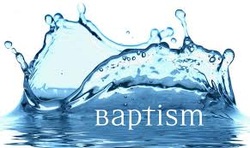Believer's Baptism

We believe in the ordinance of baptism as a celebration of our new life in Christ.
Baptism is an ordinance of the Church. This means it is "ordained" or ordered by Jesus Christ. Jesus commissioned his disciples, "Go therefore and make disciples of all nations, baptizing them in the name of the Father and of the Son and of the Holy Spirit" (Matthew 28:19 NRSV).
Baptism is an outward symbol of an inward grace. When we believe in and commit ourselves to following Christ, a fundamental change takes place. We receive God's acceptance, forgiveness, and direction for living. "If anyone is in Christ, he is a new creation, the old has gone, the new has come!" (2Corinthians 5:17NIV) Baptism represents the death, burial, and resurrection of the Lord Jesus Christ and the believer's participation in that divine process.
The ordinance of baptism is a public symbol. When we are baptized, we are giving public witness that we believe in Christ and are committed to following him.
We recognize a relationship between the baptism of the believer and the baptism of Jesus. Although the Scriptures teach that Jesus was without sin, he nevertheless submitted to the baptism administered by John the Baptist.
The baptism of Jesus signified three things:
1) Obedience to God the Father. Regarding his baptism, Jesus said, "Let it be so now. It is proper for us to do this to fulfill all righteousness" (Matthew 3:15 NIV).
2) Servanthood. By being baptized Jesus expressed his incarnate presence among us, as one of us, to serve us.
3) Acceptance of the sin-bearing ministry of the cross. Because Jesus had no sin, his baptism anticipated the sin he would bear for us on Calvary 's cross. John the Baptist said, "Look, the Lamb of God who takes away the sins of the world" (John 1:29 NIV).
We practice "believer's baptism."
Those who profess faith in Christ and express commitment to follow him are eligible for baptism. The early Church made confession and repentance prerequisites for baptism. Peter said, "Repent and be baptized, every one of you, in the name of Jesus Christ so that your sins may be forgiven" (Acts 2:38 NIV). The Ethiopian official asked Philip, "Look, here is water. Why shouldn't I be baptized?" (Acts 8:36 NIV).
Since baptism properly comes after an expressed faith in Christ and conscious commitment to follow him, we believe only believers with the maturity to make such commitment are qualified candidates for baptism.
Because we believe that only willing response to God by the individual brings salvation, the FaithWorks Christian Fellowship neither practices, nor sees the necessity of infant baptism. We trust that those who have not yet reached the state of accountability are safe in the grace of God (Romans 7:7-12). Nonetheless, we believe that the child shares the benefits of Christian fellowship in the nurturing ministries of responsible parents and the community of faith. This responsibility is accepted and made meaningful in the service of Presentation of Children for the Lord's Blessing.
We believe baptism is not essential for salvation. Paul tells us, "If you confess with your mouth, 'Jesus is Lord,' and believe in your heart that God has raised him from the dead, you will be saved. For it is with your heart that you believe and are justified, and it is with your mouth that you confess and are saved" (Romans 10:9-10 NIV). Because believing in Christ is the only requirement for receiving saving grace, we see baptism as a public witness in obedience to the Word of God of grace already received. In keeping with Christ's example and teaching, we encourage every believer to participate in the ordinance of baptism as an act of obedience and witness.
Because baptism is not essential for salvation, and acceptance of Christ as Savior and Lord is the essential requirement for salvation and admission to the church, we grant membership to believers who have not yet been baptized.
We believe the biblical form of baptism is by immersion.
Matthew's report of John's ministry is, "Confessing their sins, they were baptized by him in the Jordan River " (Matthew 3:6 NIV). Matthew and Mark speak of Jesus' baptism. "As soon as Jesus was baptized, he went up out of the water" (Matthew 3:16 NIV), and "As Jesus was coming up out of the water …" (Mark 1:10 NIV). When Philip baptized the Ethiopian official, "both Philip and the eunuch went down into the water and Philip baptized him." The Scriptures conclude, "They came up out of the water" (Acts 8:38 -39 NIV).
No other mode of baptism is compatible with the New Testament nor as graphic in illustrating the meaning of Christian faith. The Bible says immersion was the form of baptism administered by John the Baptist and the apostles. Paul's explanation of the symbolism of baptism confirms that immersion is the form to be used. "We were therefore buried with him through baptism into death in order that, just as Christ was raised from the dead through the glory of the Father, we too may have new life" (Romans 6:4 NIV).

